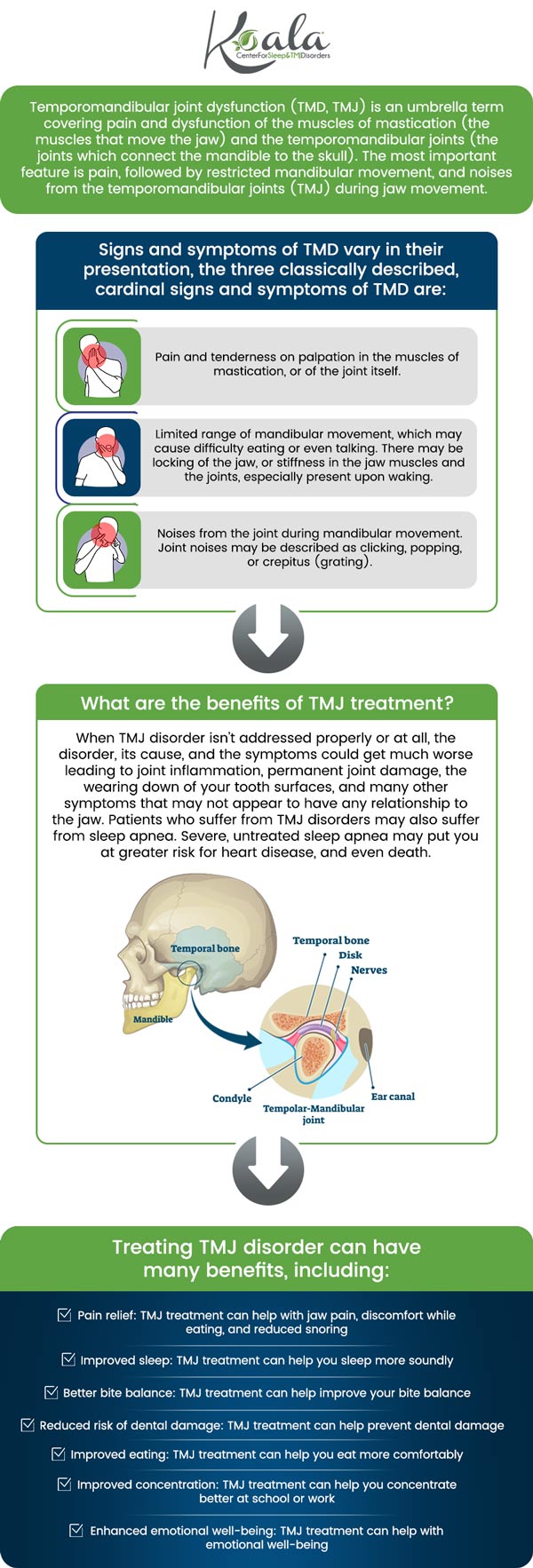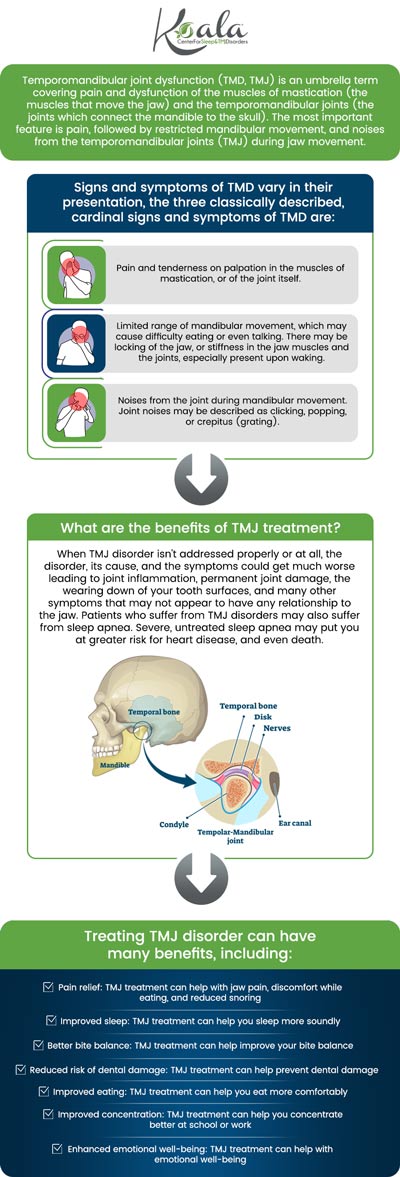What Are My Options for TMJ Treatment?
Are you suffering from TMJ and looking for the best treatment options? Learn more about what options are available for TMJ treatment at Koala® Center For Sleep & TMJ Disorders today. For more information, please contact us today or request an appointment online. We have convenient locations in Bloomington IL, Peoria/Dunlap IL, El Paso TX, and Wausau WI.




Table of Contents:
How do you Treat TMJ?
What happens if TMJ is left untreated?
What are my treatment options for TMJ?
What are the symptoms of TMJ?
The TMJ, or temporomandibular joint, is a complex joint responsible for the jaw’s ability to open and close. This enables eating, chewing, talking, singing and even yawning. Unfortunately, since the TMJ is an intricate joint composed of many interworking parts, there are several problems that can affect this joint. Thankfully, there are medical professionals who dedicate their entire careers to helping people resolve their TMJ problems and specialize in many different treatment options.
The best treatment for TMJ depends on a number of factors, including:
– The cause of the condition
– The severity of the condition
– The symptoms present
– If other treatments have been tried previously with no success
– How the patient responds to treatment
Depending on the aforementioned factors, a dentist who specializes in treating TMJ disorders will determine the best treatment for your individual situation. The professionals at Koala® Center For Sleep & TMJ Disorders can help you find relief from your TMJ symptoms. Call us today!
If TMJ disorder is left untreated, it can interfere greatly with the lives of those affected by it. Symptoms of headaches, neck tension, tooth grinding and jaw pain can worsen, making it difficult to perform even the simplest of tasks. Sleep can be interrupted from tooth grinding and clenching, which can lead to long term issues such as sleep apnea, insomnia and imbalanced sleep/wake cycles. Because it interferes with the body’s natural hormonal responses, sleep disturbances can play a large role in depression and anxiety.
Therefore, if TMJ disorder does not receive treatment, it may lead to long-term effects that have a profound impact on general health and wellness. Your dentist may also express concern over signs of TMJ disorder, such as a premature wearing down of teeth and gums, which can be caused by grinding and clenching. Lastly, some people with TMJ disorder experience inner ear issues such as vertigo, balance problems and ringing (tinnitus). Knowing all of this, it is easy to understand how leaving TMJ disorder untreated can lead to unwanted consequences.
1. Custom Oral Appliance Therapy
This is the cornerstone of TMJ treatment at Koala. A tailored dental appliance (like the Gelb appliance) is worn—typically at night—to gently reposition the jaw into its optimal, relaxed alignment. This eases pressure on the TMJ, reducing pain, inflammation, and muscle strain.
2. Therapeutic & Physical Interventions
Koala takes a multi-faceted, non-surgical approach including:
Physical therapy techniques like jaw exercises, heat/cold therapy, and TENS (electrical stimulation) to relax muscles and improve mobility.
Behavioral strategies such as stress reduction practices and posture improvements, which help address underlying causes like jaw clenching.
3. Medicinal Support & Injectables
When needed, they may integrate pharmacological support, including:
NSAIDs or muscle relaxants to ease pain and inflammation,
Corticosteroid injections for targeted relief in more inflamed joints.
4. Surgical Options (Only as Last Resort)
Surgery is rarely required and reserved for severe or degenerative TMJ cases. Koala prioritizes non-invasive strategies and only considers surgical interventions after all other treatments have been tried without success.
TMJ has many signs and symptoms that can vary greatly from person to person. The most common symptoms of TMJ include:
– Pain in the jaw, face, neck and shoulders
– Pain in or around the ear when chewing, talking, or opening the mouth wide
– Problems opening the mouth wide
– Jaw that gets “stuck” or “locked”, either open or closed
– Clicking, popping, or grating sounds in the jaw joint, which most commonly occurs when opening or closing the mouth to chew. This may or may not be painful.
– A tired feeling in the face or jaw
– Trouble chewing
– A sudden uncomfortable bite, as if the upper and lower teeth are no longer properly aligned
– Swelling on the side of the face
If you or someone you love is experiencing the signs and symptoms of TMJ disorder, come to Koala® Center For Sleep & TMJ Disorders for treatment you can trust. Our kind and compassionate professionals are experienced in evaluating, diagnosing and treating TMJ disorders and can help you find long-term relief. We are dedicated to delivering the highest level of service at each visit, for every patient. Contact us today to request an appointment online. We look forward to serving you!

Additional Services You May Need
▸ KoalaKIDZzz®
▸ Sleep Apnea
▸ Snoring
▸ TMJ Disorder
▸ Fatigue
▸ Sleep Disorders
▸ Weight Loss
▸ CPAP Alternative
▸ Oral Appliances




